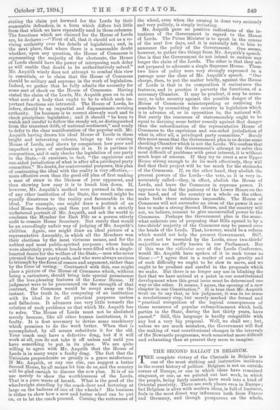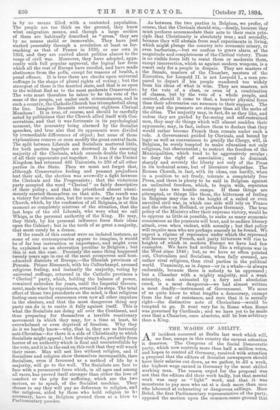THE SECOND BALLOT IN BELGIUM.
MHE complete victory of the Clericals in Belgium is 1. one of the most striking and instructive incidents in the recent history of politics. Belgium is not an outside corner of Europe, or one in which ideas have remained stagnant, or one, as we pointed out last week, in which the people, being fairly content, have sunk into a. kind of Oriental passivity. There are such places even in Europe ; but Belgium is alive with modern ideas, is full of business, feels in the most direct way influences both from France and Germany, and though prosperous on the whole, is by no means filled with a contented population. The people are too thick on the ground, they know what emigration means, and though a large section of them are habitually described as "gross," they are by no means stolid or immovable. They have just worked peaceably through a revolution at least as far- reaching as that of France in 1830, or our own in 1832, and they are excited about politics almost to the verge of civil war. Moreover, they have adopted, appa- rently with full popular approval, the logical law from which all the rest of Europe have recoiled, and have made abstinence from the polls, except for reasons of health, a penal offence. It is true there are checks upon universal suffrage in the shape of plural rights of voting ; but the strongest of these is the married state, and that is as open to the wildest Red as to the most moderate Conservative. The vote must therefore be taken to be the vote of the mass of the people, yet under such circumstances, and in such a country, the Catholic Church has triumphed all along the line. Imagine Brussels returning eighteen Clerical Members ! It is true, of course, and should be carefully noted by politicians that the Church allied itself with Con- servatism, and that it was fortunate in its psychological moment, the peasantry being alarmed by the Socialist s,peeckes, and true also that its opponents were divided by irremediable differences of object ; but none of these explanations remove or even modify the great central facts. The split between Liberals and Socialists mattered little, for both parties together are drowned in the amazing majority of the Clericals, which exceeds double the total of all their opponents put together. It is as if the United Kingdom had returned 466 Unionists, to 200 of all other parties in the State. Then we must not forget that, although Conservative feeling and peasant prejudices lent their aid, the election was avowedly a fight between the Clericals and the Progressists ; that the victorious party accepted the word " Clerical " as fairly descriptive of their policy ; and that the priesthood almost unani- mously exerted themselves on that side. The result was a victory for others also, but for none so clearly as for the Church, which, by the confession of all Belgians, is at this moment so completely mistress of the situation, that the last hope of the old Liberals, who were what we call Whigs, is the personal authority of the King. He may, they think, by his personal influence force their ideas upon the Cabinet ; but in the teeth of so great a majority, that must surely be a dream. If the result of this contest were an isolated instance, as some of our contemporaries appear to imagine, it would be of far less instruction or importance, and might even be explained as an aberration peculiar to Belgium ; but this is not the case. Precisely the same thing happened twenty years ago in one of the most prosperous and best- educated districts of Europe,—the Rhenish provinces of Prussia. Prince Bismarck, with his Culturlsampf, aroused religious feeling, and instantly the majority, voting by universal suffrage, returned in the Catholic provinces a " Clerical " party, which, holding the balance of power, remained unbroken for years, until the Imperial Govern- ment, made wiser by experience, retraced its steps. The total effect of those two precedents on the mind, is that religious feeling once excited overcomes even now all other impulses in the electors, and that the most dangerous thing any party can do is to excite it fully against itself. This is what the Socialists are doing all over the Continent, and thus preparing for themselves a terrible reactionary movement in which they may, for a time at least, be overwhelmed or even deprived of freedom. Why they do it we hardly know—why, that is, they are so furiously anti-Christian—for there is a side of Christianity to which Socialists might appeal ; but they always do, probably from horror of an authority which is final and uncontrollable by the vote, and it is in the end on this rock that they will wreck their cause. Man will not live without religion, and if Socialism and religion show themselves incompatible, then Socialism, even if favoured as a method of life by a majority, will go to the wall. The Socialists are face to face with a permanent force which, in all ages and among all races, has proved itself stronger than either the love of comfort or the pity for suffering, which are the two motors, so to speak, of the Socialist machine. They choose to say they will pay no deference to religion, and the religious, aided by those who hold religion to b necessary, have in Belgium ground them at a blow to Parliamentary powder. As between the two parties in Belgium, we prefer, of course, that the Clericals should win,—firstly, because they must perforce accommodate their acts to their main prin- ciple that Christianity is absolutely true ; and secondly, because they will abstain from mad experiments in living, which might plunge the country into economic misery, or even barbarism,—but we confess to grave alarm at the magnitude and completeness of the Clerical victory. There is no visible force left to resist them or moderate them, except insurrection, which as against modern weapons, is a resort only for a people in despair. They are masters of the Senate, masters of the Chamber, masters of the Executive, for Leopold II. is not Leopold I., a man pre- pared to depart if his people wandered too widely from his ideas of what is wise. They are masters, not by the vote of a class, or even of a combination of classes, but by the vote of a whole people, and control, should it come to that, a heavier physical force than their adversaries can summon to their support. The Army and the peasants are stronger than all the mobs of the cities. The majority may, in fact, do as they like, and unless they are guided by far-seeing and self-restrained men, they may do things which will almost madden their opponents; may, in fact, induce them to declare that they would rather become French than remain under such a rule. A Government guided by Clericals, and bound by logic as well as convenience to gratify the Clergy, will, in Belgium, be sorely tempted to make education not only religious, but obscurantist ; to restrict the freedom of the Municipalities, which tend to be aggressively secular ; to deny the right of association ; and to diminish sharply and severely the liberty not only of the Press in its technical sense, but of literature altogether. The Roman Church, in fact, with its ideas, can hardly, when in a position to act freely, tolerate a completely free Press, and there is plenty to be said in Belgium against an unlimited freedom, which, to begin with, separates society into two hostile camps. If these things are attempted, or things like them, the bitterness of feeling in Belgium may rise to the height of a veiled or even unveiled civil war, in which one side will rely on France and the other on Holland, or perhaps Germany. The true policy of the Ministry after their supreme victory, would be to oppress as little as possible, to make as many economic concessions as the peasants will bear, and to endure literary attack, even when violent, with serenity ; but that policy will require men who are perhaps scarcely to be found. We expect a rdgime of repression under which the repressed will become very French, and party bitterness will rise to heights of which in modern Europe we have had few examples. We have had nothing like a religious war in the West since 1848; but, as we have so often pointed out, Clericalism and Socialism, when fully aroused, are rather rival religions, than rival parties in the political world. Unanimity, as in Japan—or in a whale—is always endurable, because there is nobody to be oppressed ; but a Chamber with a mighty majority, and a weak minority, each animated by a fiery and absolutist creed, is a most dangerous—we had almost written a most deadly—instrument of Government. We none of us quite know to what lengths a democracy, exempt from the fear of resistance, and sure that it is morally right—the distinctive note of Clericalism—would be tempted to go. It went very far in Rome when Rome was governed by Cardinals ; and we have yet to be made sure that a Chamber, once absolute, will be less arbitrary than a King.







































 Previous page
Previous page